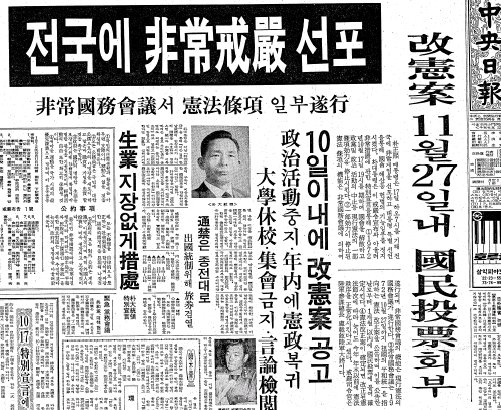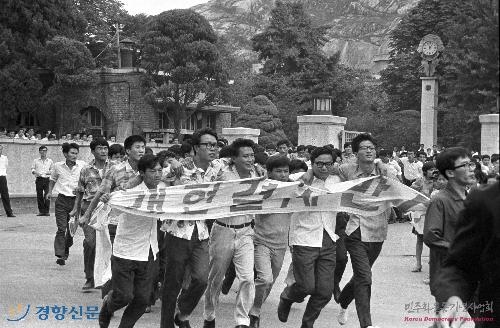University lifestyle in the 1970’s can be represented with the image of students with long hair wearing blue jeans, and playing acoustic guitars while drinking some beer. These sorts of habits began to appear as hippie culture came into South Korea starting in the 60’s. The quick speed, at which this sort of lifestyle spread is, in some part, due to the oppressive social atmosphere caused by the dictatorship at the time. Students were deprived of their freedom, so they turned to the more romantic Western cultures instead.
All throughout the 1970’s university students demonstrated against the existing government. In return, the government issued the closing of certain schools in order to keep students from gathering together to protest. Due to the endless fights against the government, many students who attended university during the 70’s were not able to attend their classes regularly.
In 1971, demonstrations held by universities in Seoul were getting to be more intense by the day. The situation was showing no signs of improvement and military forces were placed at schools at the request of Yang Taek-Sik, the mayor of Seoul at the time, and schools were eventually closed down temporarily. However, the students’ strong will and demands could not be suppressed by force.

A major event took place on August 8th of 1973, in which Kim Dae-Jung was kidnapped in Japan. He had lost the presidential election in 1971, and had gone to Japan due to an illness treatment. When the 4th republic was started in 1972, Kim decided to stay in Japan and engaged in activities opposing to the authoritarian government of South Korea. On October 2nd of the year that the kidnapping took place, students studying at the College of Liberal Arts and Sciences from Seoul National University held a historical demonstration demanding the restoration of liberal democracy as well as freedom of speech. Instantly, several major universities located in Seoul held protests requesting the same contents and this spread on to other universities throughout the whole country.

Chung-ang University was not left out in this revolt against the government either. An Jeong-Bae, who entered Chung-ang University in 1973, reflects upon the atmosphere back then in his blog.
‘On March of 1973, I was admitted into Chung-Ang University’s College of Politics and Economics. During my second semester in October, a demonstration took place at the Liberal Arts building which is where the 1st year students studied. It was the first protest that had taken place at Chung-Ang University after the authoritarian government had come to power. Nearly all of us 1st year students participated in this demonstration. Little did we know that our demand for freedom would continue for years to come. The 1st year students gathered in front of the school’s Eui-Hyeol Tower, a memorial top for the students who were sacrificed in the 4.19 revolution, and shouted for freedom. Several demonstrations took place on school grounds until the end of November, and we once even marched past the back gate and advanced to Sang-do. Winter break was soon upon us, and every year after that, it was a repetition of demonstrations demanding democracy, closing down of the school, and break would be upon us again.’
Another famous incident of the 70’s is the National Student Federation Happening. In April 1975, several students started making efforts to bring together the scattered groups of students all across the nation to form a student movement organization. Among this group, which was referred to as the ‘7 member committee’, a student from Chung-ang University, Lee Myung-Jun, was included. This committee decided to connect 18 universities across the country and by May, they had made a declaration, which stated that they were willing to fight against the current dictatorship. However, their acts were caught early on by investigative forces. The 23 students who were arrested refused to receive trial in a court of dictatorship. These students were eventually called separately to be given their sentences, but they had succeeded in refusing the authoritarian government in their own way.
The 70’s were a time in which the strong desire for democracy and romantic campus life coexisted with one another. It is due to the active protests of the students at the time, that we are able to enjoy the current freedom of democracy.

